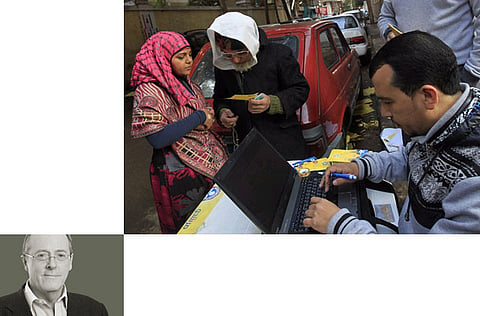How long will 'awakening' last?
Arab populations who escaped secular betrayers must not fall into the hands of corrupt extremists

Last year will be remembered as ‘the year of the Arab Spring'. We will take it as a mystifying year.
Where did the Tunisian and Egyptian revolutions lead to, if not to the success of the Muslim Brotherhood and that of the Salafists? What did the colonial war in Libya bring its people: a kind of a democracy as some western misfits call it, or an incongruous power split between feuding tribes, sects and their wealthy foreign sponsors?
The fact that the people who organised the Tahrir Square revolution in Egypt were outmanoeuvred and outvoted by the Muslim Brotherhood and its supporters was clear and expected, Palestinian analyst Rashid Khalidi explains. But the success of the Salafists was unexpected.
Masks have fallen, as witnessed by the behaviour of an Arab League that has now entered a new era with different people in command. Why not, if it is for the sake of a better democracy, an end to dictatorship, less corruption and a move for more secular freedom? But is it really worth it if it is for a narrow sense of religious belonging, with little liberty for minorities?
Some people thought of ‘bringing democracy to Libya' — as a way to contribute to the ‘Arab awakening'. It is why 2012's future looks so gloomy and, unfortunately, rather clear: there is no reason that whatever was ignited in 2011 will not be pursued in the coming months. The alliance between an economically conservative and liberal Muslim Brotherhood, and the long-time ally of the US, the armed forces, sponsored by wealthy neighbours, will start managing those countries.
The neo-conservative Greater Middle East initiative of former US president George W. Bush is finally coming to fruition: Islamists believe in capitalism and the Americans can therefore rely on them. And the information networks will contribute their bit.
"The most modern information and marketing technologies to the service of one of the most backward ideologies," writes Tunisian essayist Mezri Haddad. Lastly, money will go on being poured, very indecently indeed as if cheque books could take the place of diplomacy — but who would dare blame poor people for their greed? The picture emerging from the Arab Spring seems therefore well on track, except maybe on two issues — if the people dare.
The first one, which is the Israeli-Palestinian conflict, may be of very little interest to those who now talk loudly in Arab League conferences. Who indeed would care about a Palestinian cause which prevents many from doing lucrative business with a friendly Israel? But there is no need to panic: talks of the ‘two-state solution' will obviously go on, for the sake of keeping foreign chancelleries busy. "Anyone who is an advocate of the two-state solution has to tell me how a 40-plus year-old process can be reversed ... The bulldozers never stop," said Khalidi in the last interview conducted in Israeli daily Haaretz by the late Columbia University Professor Edward Said.
Toppling game
Meanwhile, the Israeli government will go on turning the world's attention to the fanciful ‘Iranian threat' through its diversified networks and lobbies. And Palestinian children will go on starving in hopeless ‘temporary' camps, until they awake upon their turn, this time maybe for a real Arab awakening.
The other issue is Syria. Since it has been made public that foreign forces are trying to help topple the only remaining secular government in the region, some of the Baathist propaganda has taken ground. "Friends of Abdul Hakim Belhaj [the Libyan Islamist leader] have penetrated Syria via Turkey," the French daily Le Figaro recently reported, seeming happy with it. To some extent, regional governments which import Libyan soldiers into Syria remind me of the Americans financing Osama Bin Laden and the mujahideen 30 years ago in Afghanistan, to help fight the Soviets. One remembers the consequences, which may also include future palace revolutions.
A genuine peace process in Syria will derive from a national dialogue. Opposition forces that are supported by outsiders will only contribute to give the process a sectarian twist. This is why a solution cannot be imposed by neighbours — even though former closest friends, who changed their mind, now act as the true perpetrators of the ‘Kissinger doctrine', which is dismantling strong Arab countries and splitting them on religious and ethnic lines, for the greater glory of Israel.
In the end, our wish for the Syrian people for the coming months is to let them find a way out by themselves. As for the Arab populations who have ‘awakened', and having escaped the hands of secular betrayers, we must not let them fall into the hands of corrupt extremists, with whom we'll talk about democracy the day they are able to respect the rights of their own minorities.
Luc Debieuvre is a French essayist and a lecturer at IRIS (Institut de Relations Internationales et Stratégiques) and the "FACO" Law University of Paris.


